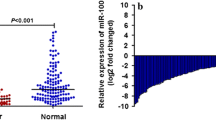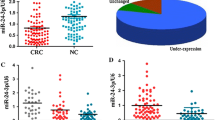Abstract
miR-195, one of the miR-16/15/195/424/497 family members, has been shown to play an important role in tumorigenesis, as a tumor suppressor. Here, we assess miR-195 expression in colorectal cancer, which has not been investigated before, and its clinical significance including survival analysis. The in vivo significance of expression of miR-16/15/195/424/497 in matched normal and tumor tissues of colorectal cancers was evaluated using a quantitative real-time RT-PCR. Two colorectal cancer cell lines and 85 colorectal cancer and paired normal patient samples with detailed clinical follow-up information were selected. The statistical significance of these markers for disease prognosis was evaluated using a two-tailed, paired Wilcoxon test. A Kaplan–Meier survival curve was generated following a logrank test. As a result, miR-424 was significantly over-expressed, while miR-15a, miR-15b, miR-16, and miR-195 were downregulated in tumors compared with normal colorectal samples (all P < 0.01). Reduced expression of miR-195 occurred more often in patients with lymph node metastasis and advanced tumor stage (all P < 0.01). Kaplan–Meier survival analysis indicated that patients with reduced miR-195 had a poor overall survival (P < 0.01). Moreover, the multivariate analysis showed that reduced expression of miR-195 was an independent predictor of overall survival. Our data indicate the potential of miR-195 as a novel diagnostic or prognostic biomarker for CRC.



Similar content being viewed by others
References
Parkin DM, Bray F, Ferlay J, Pisani P. Estimating the world cancer burden: Globocan 2000. Int J Cancer. 2001;94:153–6.
Ahmed MA, et al. CD24 shows early upregulation and nuclear expression but is not a prognostic marker in colorectal cancer. J Clin Pathol. 2009;62:1117–22.
Morris EJ, Maughan NJ, Forman D, Quirke P. Who to treat with adjuvant therapy in Dukes B/stage II colorectal cancer? The need for high quality pathology. Gut. 2007;56:1419–25.
Lagos-Quintana M, Rauhut R, Lendeckel W, Tuschl T. Identification of novel genes coding for small expressed RNAs. Science. 2001;294:853–8.
Bartel DP. MicroRNAs: genomics, biogenesis, mechanism, and function. Cell. 2004;116:281–97.
Ambros V. The functions of animal microRNAs. Nature. 2004;431:350–5.
Croce CM. Oncogenes and cancer. N Engl J Med. 2008;358:502–11.
Slack FJ, Weidhaas JB. MicroRNA in cancer prognosis. N Engl J Med. 2008;359:2720–2.
Schwind S, et al. Prognostic significance of expression of a single microRNA, miR-181a, in cytogenetically normal acute myeloid leukemia: a cancer and leukemia Group B Study. J Clin Oncol. 2010;28:5257–64.
Calin GA, et al. Frequent deletions and down-regulation of micro- RNA genes miR15 and miR16 at 13q14 in chronic lymphocytic leukemia. Proc Natl Acad Sci USA. 2002;99:15524–9.
Cimmino A, et al. miR-15 and miR-16 induce apoptosis by targeting BCL2. Proc Natl Acad Sci USA. 2005;102:13944–9.
Linsley PS, et al. Transcripts targeted by the microRNA-16 family cooperatively regulate cell cycle progression. Mol Cell Biol. 2007;27:2240–52.
Chen RW, et al. Truncation in CCND1 mRNA alters miR-16–1 regulation in mantle cell lymphoma. Blood. 2008;112:822–9.
Bonci D, et al. The miR-15a-miR-16–1 cluster controls prostate cancer by targeting multiple oncogenic activities. Nat Med. 2008;14:1271–7.
He L, et al. A microRNA polycistron as a potential human oncogene. Nature. 2005;435:828–33.
Kulda V, et al. Relevance of miR-21 and miR-143 expression in tissue samples of colorectal carcinoma and its liver metastases. Cancer Genet Cytogenet. 2010;200:154–60.
Schetter AJ, et al. MicroRNA expression profiles associated with prognosis and therapeutic outcome in colon adenocarcinoma. JAMA. 2008;299:425–36.
Slaby O, et al. Altered expression of miR-21, miR-31, miR-143 and miR-145 is related to clinicopathologic features of colorectal cancer. Oncology. 2007;72:397–402.
Wang S, et al. Improvement of tissue preparation for laser capture microdissection: application for cell type-specific miRNA expression profiling in colorectal tumors. BMC Genomics. 2010;11:163.
Calin GA, et al. A MicroRNA signature associated with prognosis and progression in chronic lymphocytic leukemia. N Engl J Med. 2005;353:1793–801.
Nicoloso MS, et al. MicroRNAs–the micro steering wheel of tumour metastases. Nat Rev Cancer. 2009;9:293–302.
Gaur A, et al. Characterization of microRNA expression levels and their biological correlates in human cancer cell lines. Cancer Res. 2007;67:2456–68.
Aqeilan RI, Calin GA, Croce CM. miR-15a and miR-16-1 in cancer: discovery, function and future perspectives. Cell Death Differ. 2010;17:215–20.
Xu T, et al. MicroRNA-195 suppresses tumorigenicity and regulates G1/S transition of human hepatocellular carcinoma cells. Hepatology. 2009;50:113–21.
Flavin RJ, et al. Potentially important microRNA cluster on chromosome 17p13.1 in primary peritoneal carcinoma. Mod Pathol. 2009;22:197–205.
Yang H, et al. MicroRNA expression profiling in human ovarian cancer: miR-214 induces cell survival and cisplatin resistance by targeting PTEN. Cancer Res. 2008;68:425–33.
Lin SL, Chiang A, Chang D, Ying SY. Loss of mir-146a function in hormone-refractory prostate cancer. RNA. 2008;14:417–24.
Petillo D, et al. MicroRNA profiling of human kidney cancer subtypes. Int J Oncol. 2009;35:109–14.
Wang YX, et al. Initial study of microRNA expression profiles of colonic cancer without lymph node metastasis. J Dig Dis. 2010;11:50–4.
Liu Q, et al. miR-16 family induces cell cycle arrest by regulating multiple cell cycle genes. Nucleic Acids Res. 2008;36:5391–404.
Xia H, et al. MicroRNA-15b regulates cell cycle progression by targeting cyclins in glioma cells. Biochem Biophys Res Commun. 2009;380:205–10.
Xia L, et al. miR-15b and miR-16 modulate multidrug resistance by targeting BCL2 in human gastric cancer cells. Int J Cancer. 2008;123:372–9.
Staub E, et al. A genome-wide map of aberrantly expressed chromosomal islands in colorectal cancer. Mol Cancer. 2006;5:37.
Schumacher P, et al. The metastatic lymph node ratio predicts survival in colon cancer. Am J Surg. 2007;194:827–31 discussion 31–2.
Mitchell PS, et al. Circulating microRNAs as stable blood-based markers for cancer detection. Proc Natl Acad Sci USA. 2008;105:10513–8.
Acknowledgments
We thank Yan Wang and Jinyong Zhou for help with real-time RT-PCR. This work was in part supported by National Basic Research Priorities Program 973 Project (2011CB707702) from the Ministry of Science and Technology of China, and National Natural Science Foundation of China (30970813, 30930028).
Conflict of interest
The authors have no conflict of interest to disclose.
Author information
Authors and Affiliations
Corresponding author
Rights and permissions
About this article
Cite this article
Wang, X., Wang, J., Ma, H. et al. Downregulation of miR-195 correlates with lymph node metastasis and poor prognosis in colorectal cancer. Med Oncol 29, 919–927 (2012). https://doi.org/10.1007/s12032-011-9880-5
Received:
Accepted:
Published:
Issue Date:
DOI: https://doi.org/10.1007/s12032-011-9880-5




